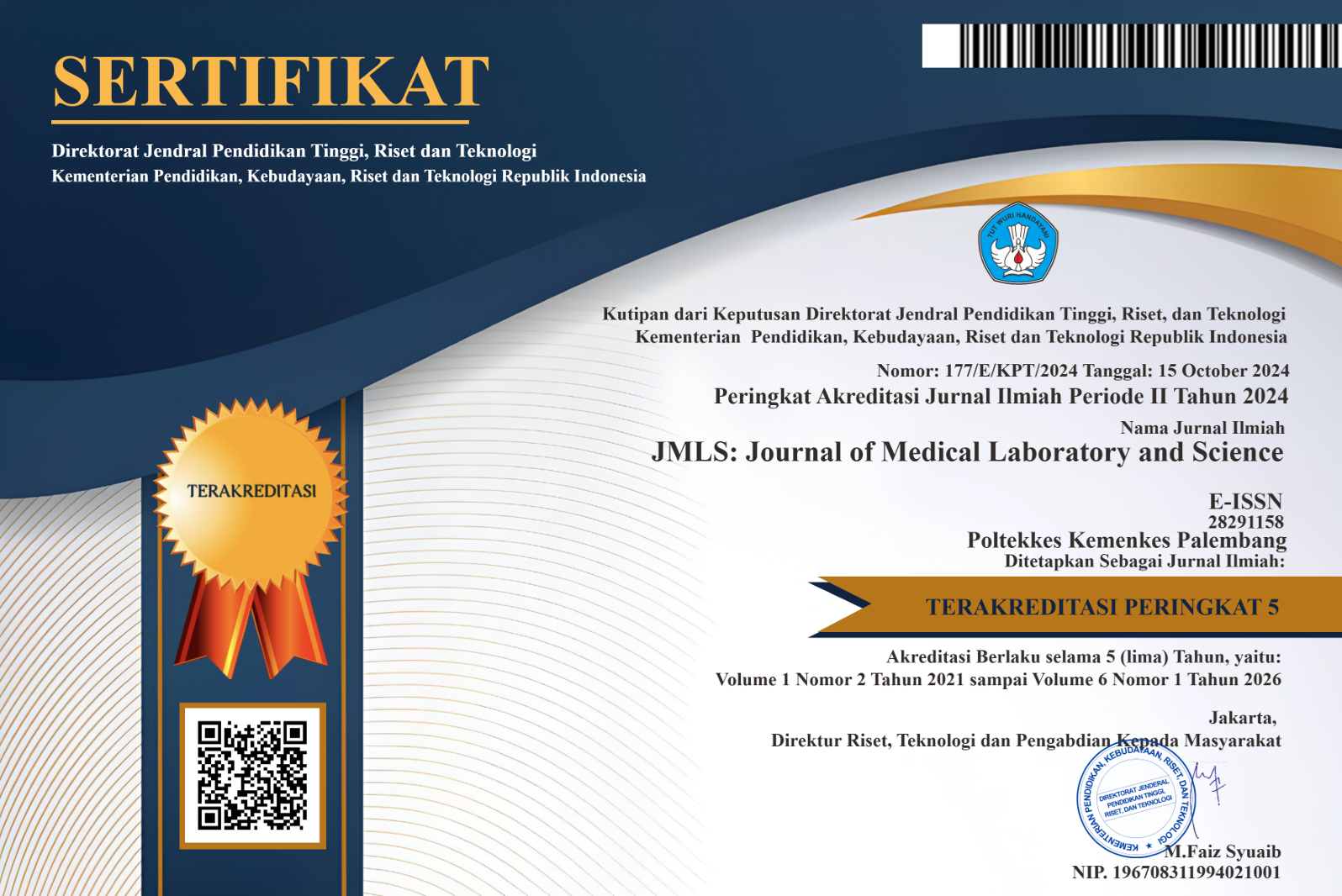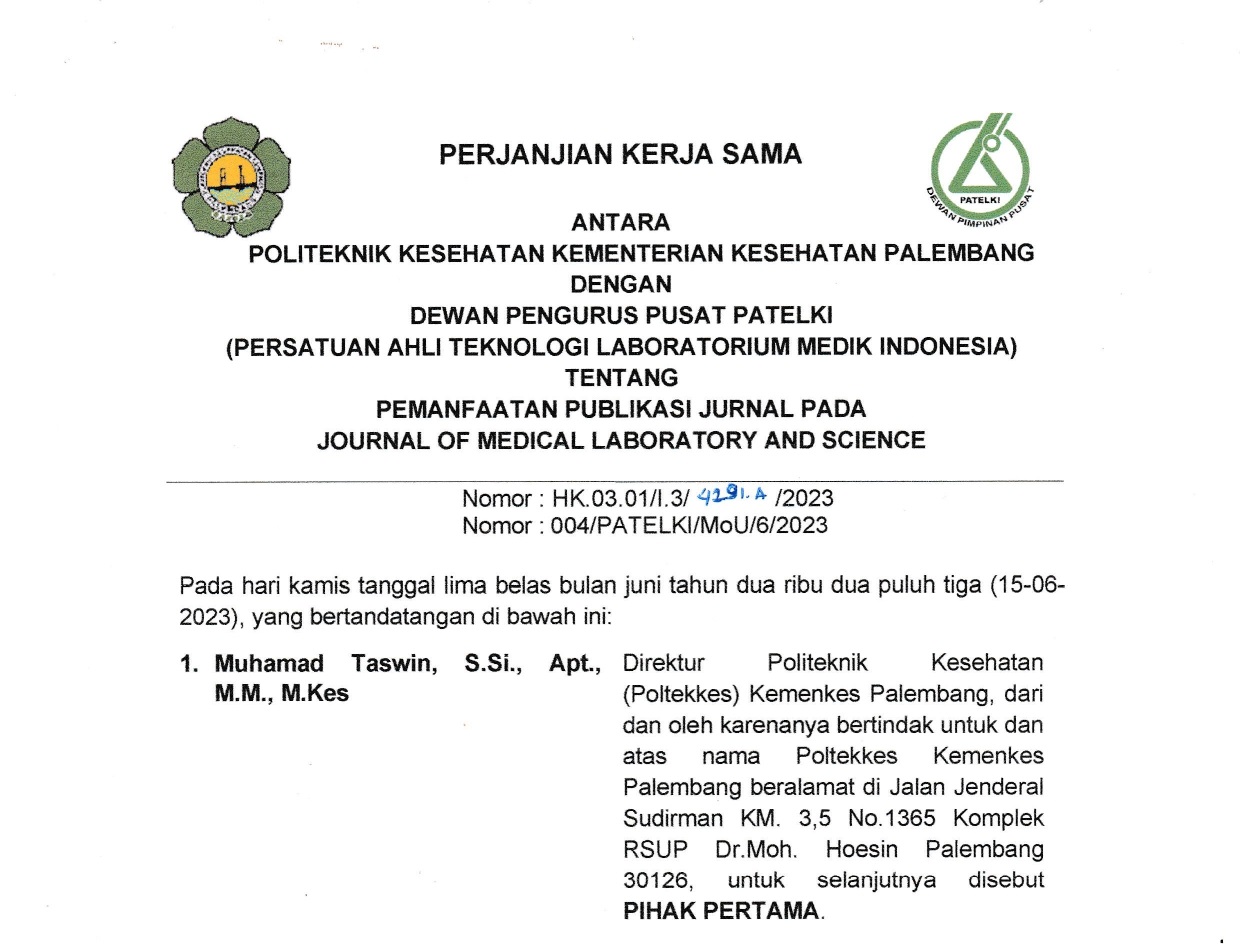GAMBARAN KEBERADAAN Escherichia coli PADA PRODUK OLAHAN DAGING BAKSO YANG DIJUAL DI KECAMATAN ILIR BARAT I KOTA PALEMBANG TAHUN 2018
Abstract
ABSTRAK
Latar Belakang : Bakso adalah produk olahan daging berbentuk bulatan atau lain yang dibuat dari campuran daging dan pati. Bakso merupakan produk yang sangat digemari masyarakat selain karena rasanya yang lezat bakso juga merupakan jajanan yang sangat mudah ditemui di mana-mana. Lingkungan, penyimpanan bahan makanan dan kebersihan diri yang kurang higienis dapat menyebabkan bakso tercemar bakteri Escherichia coli. Tujuan penelitian ini adalah untuk mengetahui gambaran keberadaan Escherichia coli pada produk olahan daging bakso yang dijual di Kecamatan Ilir Barat I Kota Palembang Tahun 2018. Metode : Penelitian ini bersifat deskriptif. Teknik sampling yang digunakan adalah purposive dengan sampel bakso yang diambil dari masing-masing 10 pedagang bakso di Kecamatan Ilir Barat I dan tiap sampel diambil sebanyak 250-300gram. Metode pemeriksaan yaitu isolasi dan identifikasi. Hasil : Dari hasil 10 sampel bakso, didapatkan 1 sampel (10%) ditemukan positif Escherichia coli. Berdasarkan lingkungan tempat berjualan yang kurang baik didapatkan hasil dari 2 sampel, 1 sampel (50%) ditemukan positif Escherichia coli. Berdasarkan penyimpanan bahan makanan yang terbuka didapatkan hasil dari 7 sampel, 1 sampel (14,3%) ditemukan positif Escherichia coli. Berdasarkan kebersihan diri yang kurang baik didapatkan hasil dari 4 sampel, 1 sampel (25%) ditemukan positif Escherichia coli. Kesimpulan : Produk olahan daging bakso yang dijual terdapat adanya Escherichia coli. Disarankan para penjual untuk menjaga kebersihan lingkungan dan kebersihan diri serta menyimpan bahan makanan secara tertutup. Bagi konsumen sebaiknya memperhatikan kebersihan makanan yang akan dikonsumsi.
Kata Kunci: Bakso, Escherichia coli, Produk olahan daging
ABSTRACT Background : Meatballs are processed meat products in the form of circles or other made from a mixture of meat and starch. Meatballs are a product that is very popular with the public, apart from the delicious taste, meatballs are also snacks that are very easy to find everywhere. The environment, food storage and unhygienic personal hygiene can cause meatballs to be contaminated with Escherichia coli bacteria. The purpose of this study was to describe the presence of Escherichia coli in processed meatball products sold in Ilir Barat I District, Palembang City in 2018. Methods: This study is descriptive. The sampling technique used was purposive with samples of meatballs taken from each of 10 meatball traders in Ilir Barat I District and each sample was taken as much as 250-300 grams. The inspection method is isolation and identification. Results: From the results of 10 samples of meatballs, 1 sample (10%) was found to be positive for Escherichia coli. Based on the unfavorable selling environment, the results obtained from 2 samples, 1 sample (50%) was found to be positive for Escherichia coli. Based on the open storage of food ingredients, 7 samples were found, 1 sample (14.3%) was found to be positive for Escherichia coli. Based on poor personal hygiene, 4 samples were found, 1 sample (25%) was found to be positive for Escherichia coli. Conclusion: Processed meatball products sold contain Escherichia coli. Sellers are advised to keep the environment clean and personal hygiene and keep food ingredients closed. Consumers should pay attention to the cleanliness of the food to be consumed. Keywords: Meatballs, Escherichia coli, Processed meat products
Copyright (c) 2021 Journal of Medical Laboratory and Science

This work is licensed under a Creative Commons Attribution-ShareAlike 4.0 International License.
Authors who publish with this journal agree to the following terms:
- Authors retain copyright and grant the journal right of first publication with the work simultaneously licensed under a Creative Commons Attribution License that allows others to share the work with an acknowledgement of the work's authorship and initial publication in this journal.
- Authors are able to enter into separate, additional contractual arrangements for the non-exclusive distribution of the journal's published version of the work (e.g., post it to an institutional repository or publish it in a book), with an acknowledgement of its initial publication in this journal.
- Authors are permitted and encouraged to post their work online (e.g., in institutional repositories or on their website) prior to and during the submission process, as it can lead to productive exchanges, as well as earlier and greater citation of published work














